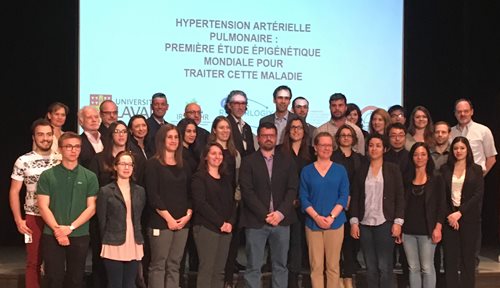 On the margins of the World Pulmonary Arterial Hypertension Day, the Quebec Heart and Lung Institute – Laval University (the Institute) is proud to announce the establishment of the first global study in epigenetics on the treatment of pulmonary arterial hypertension (PAH).
On the margins of the World Pulmonary Arterial Hypertension Day, the Quebec Heart and Lung Institute – Laval University (the Institute) is proud to announce the establishment of the first global study in epigenetics on the treatment of pulmonary arterial hypertension (PAH).
PAH1 is a complex vascular disease that mainly affects young people between the ages of 20 and 60.
These patients’ quality of life remains highly precarious, because of its symptoms that are troublesome such as the shortness of breath and the chronic fatigue. Although the current treatments partially improve the symptoms, there is none at this time to cure this severe disease that can be fatal in a few years.
Thanks to an outstanding contribution of $3.2 million from the Canadian Institutes of Health Research (CIHR), Resverlogix, and the IUCPQ Foundation, the clinical study APPRoAcH (APabetalone for PulmonaRy Arterial Hypertension), supported by Resverlogix and seven other centres around the world, will be established. This study will be led by doctors Steeve Provencher, respirologist and researcher at the Institute, co-founder of the PAH Research Group and Associate teaching clinician at the Laval University’s Faculty of Medicine, and also Sébastien Bonnet, another researcher at the Institute and co-founder of the PAH Research Group, holder of the Canadian Research Chair in Translational Research in Pulmonary Vascular Diseases as well as a full professor at the Laval University’s Faculty of Medicine.
The team of researchers wants to build on a new molecule, apabetalone, which would be capable of modifying the expression of genes that are responsible for the cells to multiply; the latter are accumulating enough to clog the pulmonary arteries. “If we are getting meaningful results in the course of this study, we hope to improve the quality of life and the survival of people around the world with pulmonary arterial hypertension,” said Dr. Steeve Provencher.
This research project is the result of the work of over 25 researchers, research professionals and students from the PAH Research Group who have been working for more than 7 years, among other things, through the support of the Canadian Research Chair in Translational Research in Pulmonary Vascular Diseases and Resverlogix, which has worked with the group during the first preclinical study involving apabetalone.
“The Pulmonary Arterial Hypertension Research Group brings together female and male researchers from clinical and fundamental environments within one and the same research program. That’s the one, based on both the clinical investigation and the basic research, that makes this group a highly functioning research team and one-of-a-kind in Canada,” explains Michel J. Tremblay, Associate Vice President, Research, Creation and Innovation. “The CIHR significant funding will enable it to achieve the APPRoAcH study, the results of which will have real benefits on the quality of life for patients with pulmonary hypertension.”
The group distinguishes itself by its leadership and manages the feat of being at once, an author of preclinical findings, and a responsible for this new clinical study. The Institute is recognized in Quebec and abroad for the expertise of its medical and research teams in respirology. “With the fact of obtaining this major funding, the Institute demonstrates its innovation capacity, its excellence in research and put forward its role as a world leader in PAH,” said Dr. Denis Richard, Director of the Institute’s Research Centre.
“Through our discovery and ongoing development of apabetalone, and through our ground-breaking work in the field of epigenetics, we are proud to support this important advancement in the potential treatment of PAH,” said Dr. Ewelina Kulikowski, Senior Vice President, Research & Development of Resverlogix. “This work is a shining example of how industry and academia can leverage their respective strengths to advance treatments into new therapeutic areas with significant unmet need.”
The annual research competition of the IUCPQ Foundation allows many researchers to undertake and continue work for the benefit of the population and the people with cardiovascular, respiratory, and obesity-related diseases. “Today’s announcement is a concrete example of the leverage effect the IUCPQ Foundation is having with many researchers in obtaining outside funding to continue their work. So I’m particularly proud when I see the impact that the grants given make in our annual research competition,” said Ms. Josée Giguère, Executive Director of the IUCPQ Foundation.
1. PAH is a rare disease that is defined by the wall thickening of the small arteries located in the lungs. This wall is hardening over time. The resulted narrowing impairs the blood circulation and increases the resistance to its passage. Therefore, the pulmonary artery pressure is rising. This pressure results in an increased effort on the heart, leading to a right heart failure. It is estimated that approximately 1 million people in the world are affected.